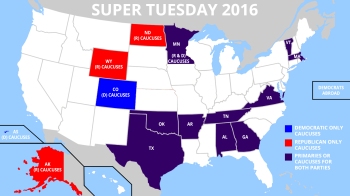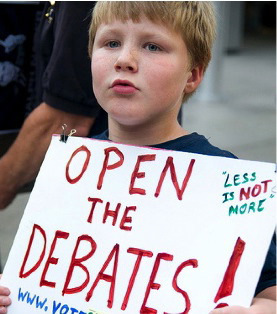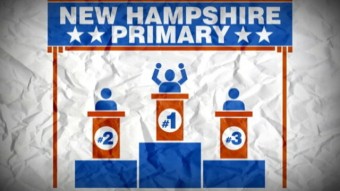Chaotic, arbitrary primary process underscores need for U.S. electoral reform
 Super Tuesday is afoot, with 661 delegates at stake in the Republican primary and 865 delegates for the Democrats. This means that a presidential candidate who does well could shift the momentum and change the media narrative in a way that fundamentally alters the course of Election 2016. Or not.
Super Tuesday is afoot, with 661 delegates at stake in the Republican primary and 865 delegates for the Democrats. This means that a presidential candidate who does well could shift the momentum and change the media narrative in a way that fundamentally alters the course of Election 2016. Or not.
Among the 12 states and one U.S. territory voting on March 1 are Alabama, Arkansas, Georgia, Massachusetts, Minnesota, Oklahoma, Tennessee, Texas, Vermont and Virginia. Voting occurs throughout the day, with polls closing at different times depending on the state. Polls in Alabama, Georgia, Vermont and Virginia close at 7 p.m., while Massachusetts, Oklahoma and Tennessee close their polls at 8 p.m. In Texas, some polls close at 8, but others close at 9. Arkansas’ polls close at 8:30 p.m. Alaska’s caucuses close around midnight.
 The big day, which could make or break several candidates on the Democratic and Republican sides (those who haven’t already dropped out after disappointing showings in earlier primary states), underscores the largely arbitrary and chaotic nature of United States primary elections, which are something of an oddity in advanced democracies.
The big day, which could make or break several candidates on the Democratic and Republican sides (those who haven’t already dropped out after disappointing showings in earlier primary states), underscores the largely arbitrary and chaotic nature of United States primary elections, which are something of an oddity in advanced democracies.
While primaries as such are relatively common, with many European countries organizing similar processes to nominate party leaders who then go on to assume the post of prime minister, in the United States the elections have a special significance, because unlike most other Western democracies, the U.S. adheres to a relatively rigid two-party system that severely disadvantages independent and minor parties.
The underlying difference is that most European countries are multi-party parliamentary democracies, which means that national governments are derived from the majority in the parliament, and utilize a system of proportional representation which ensures that parties that receive a certain amount of votes (usually a threshold of three to five percent) are guaranteed seats in the parliament.
 In the United States, which uses a strict and archaic winner-take-all system and erects severe obstacles to independent parties (including such challenges as stringent ballot access rules that vary widely from state to state and being excluded from televised debates), the two dominant parties are virtually ensured an effective monopoly over the political system. This means that the primaries are the only opportunity for the people of the United States to offer any significant input on who should assume the highest elected office in the land.
In the United States, which uses a strict and archaic winner-take-all system and erects severe obstacles to independent parties (including such challenges as stringent ballot access rules that vary widely from state to state and being excluded from televised debates), the two dominant parties are virtually ensured an effective monopoly over the political system. This means that the primaries are the only opportunity for the people of the United States to offer any significant input on who should assume the highest elected office in the land.
Because the primary process is so integral to the broader U.S. electoral system, being the only chance for average citizens to have a meaningful say in which of the two ultimate candidates becomes president, certain democratic principles should be applied to this process, for example, the electoral commitments the United States has signed onto in such landmark international agreements as the 1990 OSCE Copenhagen Document and the International Covenant on Civil and Political Rights.
In the ICCPR, for example, the signatories agreed that “Every citizen shall have the right and the opportunity … to take part in the conduct of public affairs, directly or through freely chosen representatives; [t]o vote and to be elected at genuine periodic elections which shall be by universal and equal suffrage and shall be held by secret ballot, guaranteeing the free expression of the will of the electors.”
In the 1990 OSCE Copenhagen Document, the United States agreed that it would hold “free elections that will be held at reasonable intervals by secret ballot or by equivalent free voting procedure, under conditions which ensure in practice the free expression of the opinion of the electors in the choice of their representatives.”
Subsequent paragraphs provide for “the right of citizens to seek political or public office, individually or as representatives of political parties or organizations, without discrimination; the right of individuals and groups to establish, in full freedom, their own political parties or other political organizations;” and call for such parties to be granted “the necessary legal guarantees to enable them to compete with each other on a basis of equal treatment before the law and by the authorities.”
The Copenhagen Document also “guarantee[s] universal and equal suffrage to adult citizens” and “ensure[s] that votes are cast by secret ballot or by equivalent free voting procedure, and that they are counted and reported honestly with the official results made public.” It further emphasizes the importance of avoiding discrimination among individual candidates and avoiding unnecessary obstacles to candidacies.
A strong case could be made that the U.S. electoral process is in one way or another violating just about every single one of these commitments. Not only do many U.S. states opt for a caucus system that is specifically designed to prevent any sort of secrecy of the vote (a universally accepted fundamental principle of free and fair elections), but perhaps more significantly, by utilizing a staggered system of primary elections, the United States is failing to guarantee universal and equal suffrage — and at the same time unfairly disadvantaging some candidates.
 Because so much disproportionate weight is given to the states holding early primaries, including New Hampshire and Iowa, and because states holding primaries later – such as California – often don’t even get to vote for the same candidates (many of whom will have already dropped out by that time), the system is fundamentally flawed and effectively disenfranchises millions of would-be primary voters. (For example, New York, the third-largest state, voted after the nominees had been selected in both parties in 2000 and 2004.)
Because so much disproportionate weight is given to the states holding early primaries, including New Hampshire and Iowa, and because states holding primaries later – such as California – often don’t even get to vote for the same candidates (many of whom will have already dropped out by that time), the system is fundamentally flawed and effectively disenfranchises millions of would-be primary voters. (For example, New York, the third-largest state, voted after the nominees had been selected in both parties in 2000 and 2004.)
Further, the system itself is riddled with irregularities and an ad hoc, unprofessional and chaotic election administration framework that varies wildly from state to state. See, for example, the chaos that unfolded at a Nevada Democratic caucus on February 20, 2016:
Of course, there were also serious irregularities in the Republican Nevada caucuses. As reported by The Hill on Feb. 23:
Republican officials are looking into reports of double-voting at Tuesday night’s Nevada caucuses, according to multiple reports.
The party is currently reviewing the process, and a Republican National Committee official said the “chaos is contained,” according to Mashable.
One GOP official said the party will be reviewing a master sign-in sheet, according to well-known Nevada journalist Jon Ralston.
“Obviously we take reports of double-voting very seriously and we will be reviewing the ballots,” a GOP official said.
Or, consider the insanely arbitrary nature of the earlier Iowa caucuses, which decided many of its results not by secret ballot as required by international election-related commitments, but by flipping a coin:
More generally, candidates are not treated equally or fairly, because those who perform badly in the early primary and caucus states come under enormous pressure to end their candidacies before they have a chance to compete in Super Tuesday and later primary states such as Florida, California and New York, which hold the lion’s share of state delegates.
And of course, there is also the little matter of “superdelegates,” the 15 percent of Democratic National Convention delegates who are seated automatically and may choose to vote for whoever they want, regardless of the voters’ desires as expressed in primary elections. The superdelegates include distinguished party leaders and elected officials, including all Democratic members of the House and Senate and sitting Democratic governors.
Establishment favorite Hillary Clinton has already racked up support from at least 459 superdelegates, which effectively amounts to a thumb on the scale of the election. Although she only has 52 pledged delegates that she’s picked up through primary elections and caucuses, compared to 51 pledged to Bernie Sanders, she is ahead of Sanders in the overall delegate count by 503-70.
So, rather than being in a virtual dead heat, she is in fact leaps and bounds ahead of her democratic socialist rival. Some might call this a rigged game.
There is also the issue of widespread, profound and deep-seated media bias, which was recently described by independent journalist Amy Goodman on CNN’s Reliable Sources. In addition to criticizing the media’s over reporting of polling data and the so-called “horse race” approach to covering presidential campaigns, she described the disproportionate and unbalanced level of attention given to candidates such as Donald Trump compared to the paltry and unfavorable coverage given to Bernie Sanders.
“It is astounding that Bernie Sanders is where he is today,” she said. “Look at that Tyndall Center report that found in 2015, in the months leading up to December, you had 234 total network minutes, like almost four hours, CBS, NBC, ABC, covering Trump. That’s four hours and how much got coverage? Sanders got 10 minutes. On ABC World News Tonight in that year, Sanders got 20 seconds. Trump got like 81 minutes.”
This sort of media bias has been a frequent complaint by international observers monitoring U.S. elections. Following the U.S. midterm elections in 2014, observers from the OSCE noted that “while the elections benefitted from extensive media coverage, with diverse and critical analysis of many aspects of the campaigns, the actual interest of the public appeared limited.”
“The two main parties’ campaigns were widely covered in the media,” OSCE observers noted, but “much of the focus was on campaign funding and polling data rather than substantive policy issues.”
It seems that little has changed in this regard since those criticisms were leveled in November 2014. And as Election 2016 really starts to get underway, it’s not looking promising for a shift to more constructive and balanced media coverage.
This is a situation that should be remedied before the next election if the United States is to live up to its frequent claims that it is the world’s leading democracy — one that takes its international obligations seriously.
Equally important is fundamental reform of the primary process, for example through a national primary voting system — in which all presidential primaries are held on the same day — or at least opening up the general elections to independent and minor parties such as the Greens, so that the primary elections are not as fundamentally important as they are now.
Tags: 1990 copenhagen document, 1990 osce copenhagen document, bernie sanders, donald trump, election 2016, election reform, iccpr, media
About The Compliance Campaign
Campaigning for a United States in compliance with its international obligations. Follow on Twitter here: https://twitter.com/compliancecamp Facebook: https://www.facebook.com/compliancecamp Comments, article submissions or news leads are welcome at compliancecampaign [at] gmail.com.Recent Posts
- U.S. accuses Russia of war crimes but undermines the international body that prosecutes war crimes
- Global condemnation of Russia’s war on Ukraine underscores international community’s hypocrisy
- Jill Stein-bashing and the internationally recognized right of third parties to compete
- ‘Russiagate’ impeachment push reveals U.S. indifference to corruption and war crimes
- World moves to ban nuclear weapons as U.S. flouts obligations, moves to revamp arsenal
Categories
Blogroll
- ACLU
- Amnesty International
- Arms Control Now
- Bill of Rights Defense Committee
- Center for Research on Globalization
- Death Penalty Information Center
- Democracy Now!
- Essential Opinion
- Fair Vote
- Global Issues
- Global Security Newswire
- Human Rights First
- Human Rights Watch
- If Americans Knew
- Institute for Policy Studies
- Jurist.org
- Just Foreign Policy
- Latino Political Avenue
- National Lawyers Guild
- National Security Archives
- Partnership for Civil Justice
- People's Blog for the Constitution
- Republic Report
- SCOTUSblog
- Torture Accountability Center
- US Campaign to End the Israeli Occupation
- US Human Rights Network
- Witness Against Torture

Trackbacks / Pingbacks